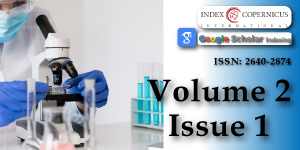Pathological Effects of Cypermethrin on the Testes and Accessory Sexual Glands of Yankasa Rams
Main Article Content
Abstract
An investigation into the pathological lesions of Cypermethrin on the testes, accessory sexual and pituitary glands of Yankasa rams was carried out. Sixteen Yankasa rams aged 18 - 30 months and weighing between 21.5 - 46.5kg were used. The 16 rams were divided equally into two groups (A and B) A served as the treatment group while B served as the control. Group (A) were given Cypermethrin (3%) at the dose rate of 3mg/kg (0.1ml/kg) body weight, topically. Group (B) rams were given distilled water at the same dose rate and route. These treatments were repeated every two weeks for a period of 12 weeks. The rams were sacrificed at the end of 12 weeks and the following organs (testes, pituitary, vesicular and prostate glands), were collected and weighed, gross pathological lesions were observed and photographs were taken. The samples were kept for histopathology. Results showed that there were no gross pathological lesions found on the testes, pituitary, prostate glands and the seminal vesicles of both groups. The mean weight of the pituitary gland, the prostate glands and the seminal vesicles of the treated and control groups were statistically not significant (P>0.05). No histologic lesions were found on them. The mean testicular weights of the treated (143.81±7.71g) and the control (130.43±0.63g) were significantly different (P<0.05). There was a reduced number of spermatozoa in the lumen of the seminiferous tubules of the treated group. It was concluded that Cypermethrin reduced spermatozoa in the lumen of the seminiferous tubules.
Article Details
Copyright (c) 2018 Simon U, et al.

This work is licensed under a Creative Commons Attribution 4.0 International License.
He F. Neurotoxic effect of insecticides current and future research: A review. Neurotoxicology. 2000; 21: 829-835. Ref.: https://tinyurl.com/y94zkzwe
Barlow SM, Sullivan FM, Lines J. Risk assessment of the use of deltamethrin on bed nets for the prevention of malaria. Food and Chemical Toxicology. 2001; 39: 407-422. Ref.: https://tinyurl.com/yboe94to
Sandhu HS, Brar RS. Textbook of Veterinary Toxicology, 1st ed. Kalyani Publ, New Dehli, India. 2000; 225-235.
Ullah MS, Ahmad M, Ahmad N, Khan MZ, Ahmad. Toxic effects of Cypermethrin in female rabbits. Pakistan Veterinary Journal. 2006; 2: 193-196. Ref.: https://tinyurl.com/yc64f734
Caroline C, Insecticide fact sheet. Journal of Pesticide Reform/Summer. 1996; 16: 1-20. Ref.: https://tinyurl.com/y9gbv2vf
Handerson HK, Parkison FN. Effect of Cypermethrin on haematology, clinical chemistry and gonads of male rabbit. Vet Med J (Giza). 1981; 31: 32-37.
Elbetieha A, Da'as SI, Khamas W, Darmani H. Evaluation of the toxic Potentials of Cypermethrin pesticide on some reproductive and fertility parameters in the male rats. Archives of Environmental Contamination and Toxicology. 2001; 41: 522-528. Ref.: https://tinyurl.com/y8xjv3k2
El-Toukhy MA, Girgis RS. In vivo and in vitro studies on the effect of Larvin and Cypermethrin on adenosine triphosphastase activity of male rats. Arch Environ Contam Toxicol. 1993; 28: 599-619. Ref.: https://tinyurl.com/y6ut6vjq
Prakash N, Kumar VM, Sunichandra U, Pavithra BH, Pawar A, et al. Evaluation of testicular toxicity following short-term exposure to Cypermethrin in albino mice. Toxicol International. Society of Toxicology. 2010; 17: 18-21. Ref.: https://tinyurl.com/yb7gdnol
Abd-Allah AEY. Effect of some pesticides on reproduction. Ph.D. Thesis (Toxicology) Faculty of Veterinary Medicine, Cairo University. 1995.
Igono M, Molokwu EC, Aliu YO. Body temperature responses of Savanah Brown goats to hamattan and hot-dry seasons. Int J Biometeorology. 1982; 26: 225-230. Ref.: https://tinyurl.com/ycstowwm
Canadian Council on Animal Care Guide. 1993.
Harper JW, Maser JD. A macroscopic study of the brain of bison, the American plain buffalo. Anatomical Record. 1976; 18: 187-202. Ref.: https://tinyurl.com/ybkmpal6
Jalal S, Ramin H, Roohollah TZ. Effect of Cypermethrin on sexual behaviour and plasma concentrations of pituitary gonadal hormones. International Journal of Fertility and Sterility. 2010; 4: 23-28. Ref.: https://tinyurl.com/yd7lfkof
Wang XZ, Liu SS, Sun Y, Wu JY, Zhou YL β- Cypermethrin impairs reproductive function in male mice by inducing oxidative stress. Theriogenology. 2009; 72: 599-611. Ref.: https://tinyurl.com/y84mao96
Hassan AB, Saliman GA, Farag AA, Sobbhy HM. Effect of the synthetic pyrethroids Sumicidin and S-3206 on male rat fertility. Veterinary Medical Journal, Giza. 1993; 41: 33-38. Ref.: https://tinyurl.com/y9mwk74l
El-Ashmawy IM, Zakaria AD, Hemed SM, El -Fikey S, Hussein YA. Cytotoxic effects of the pyrethroid insecticide (Matox) with reference to its influence on the reproductive hormone. Veterinary Medical Journal. Giza. 1993; 3: 125-130. Ref.: https://tinyurl.com/y8bq8ufh
Ubah SA, Ogwu D, Rekwot PI, Rwuaan, JS, Chibuogwu IC. Gonadal and epididymal sperm reserves of Yankasa rams treated with Cypermethrin. American Journal of Biomedical and Life Sciences. 2016; 4: 16-20. Ref.: https://tinyurl.com/y89gud25
Assayed ME, Salem HA, Khalaf AA. Protective effects of garlic extract and vitamin C against Cypermethrin reproductive toxicity in male rats. Research Journal of Veterinary Science. 2008; 1: 1-5. Ref.: https://tinyurl.com/y88t9nt9
Daniel WW. Analysis of variance. In: Daniel WW (Ed) Biostatistic: A Foundation for Analysis in the Health Sciences. John Wiley & Sons, Hoboken. 1991; 74-320.





